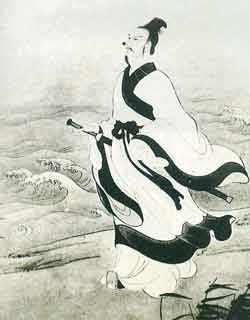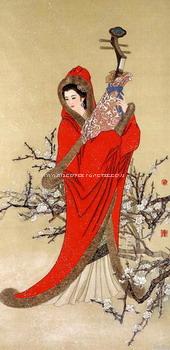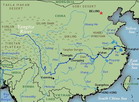2020 Yangtze River Cruise and Ferry Starting from 79 USD p.p.!
Zigui introduction
Qu Yuan, one of China's greatly
loved patriotic poets, was born in 340 BC in
the Qu family  village
very near Zigui. The fame of the walled town
on the north bank dates his period long ago.
village
very near Zigui. The fame of the walled town
on the north bank dates his period long ago.
Qu Yuan's Memorial Hall,
with its distinctive white gateway and walls
edged in red, is visible on the hillside east
of the town. It contains a Ming--dynasty (1368-1644)statue
of the poet, as well as stone inscriptions.
The great poet served as a chancellor
to King Huai of the Kingdom of Chu, with special
responsibility for the royal clans. The king
had complete trust in him until discord developed
among the clans and Qu was falsely slandered.
Banished from the capital,he wandered about
in Hubei Province, deeply sad and bitter. His
poetry and essays reveal his romanticism, loyalty
and patriotism. Qu had vigorously advocated
that the State of Chu stand firm against attack
by the Qin state, but his advice had gone unheeded,
and in May of the year 278 BC, he drowned himself
in Dongting Lake at the age of 62.
According to historical records,
the local people scoured Dongting Lake for his
body, beating drums and racing their boats in
the course of their search. This event came
to be commemorated each May, and to this day
the Dragon Boat Festival(Duanwu Jie) is held
in the river towns up and down the Yangtze and
in many other parts of China. Zongzi--packets
of sweetened rice steamed in leaves and tied
with reeds--were thrown into the water as a
sacrifice to Qu Yuan. The tradition of eatingzOngzi
at this festival continues in Chinese communities
the world over.
There are many fairy tales about
Qu Yuan. East of Zigui is a bay named after
him.lt is said that when he died, a huge fish
swallowed him up and swam all the way from Dongting
Lake past Zigui to Yufu  and
back again, where it disgorged the body, amazingly
stil1 intact . In his home village is the Qu
Field which he allegedly tilled. It is said
that he never forgot his ancestral home, to
the farmers there he introduced a jade-white
rice which was soft and fragrant. Locals remember
him at each new rice harvest.
and
back again, where it disgorged the body, amazingly
stil1 intact . In his home village is the Qu
Field which he allegedly tilled. It is said
that he never forgot his ancestral home, to
the farmers there he introduced a jade-white
rice which was soft and fragrant. Locals remember
him at each new rice harvest.
XIANG XI (FRAGRANT STREAM)
A small stream just below
Zigui and above the entrance to Xiling Gorge
is well known to all Chinese as the home of
the beautiful Han-dynasty (206 BC--AD220) heroine
Wang Zhao jun. Her story is the quintessence
of virtuous patriotism.
Zhao jun, a maid
of honour to the emperor, refused to bribe the
painter from whose portraits of court ladies
the emperor traditionally chose his concubines.
In revenge, the painter portrayed her as quite
hideous, and so imperial favour was denied her.
In 22 BC the emperor, wishing to make a marriage
alliance with the northern Xiongnu king, chose
Wang Zhao jun. Only then did he set eyes on
her; he was captivated but it was too late.
Married to the Xiongnu king, Zhao jun was able
to exert a good influence on relations between
the Xiongnu and Han peoples, which gained her
great respect. The emperor, in his rage at having
lost her, decreed the beheading of the corrupt
court painter. Local people say that before
her marriage, Wang Zhaojun returned to her home
town and, when washing in the stream, dropped
a precious pearl which caused the stream to
become crystal-clear and fragrant. Tradition
names a pavilion-topped mound to the south of
Hohhot in Inner Mongolia as her burial site.
• ZiGui
• How much for a life?



